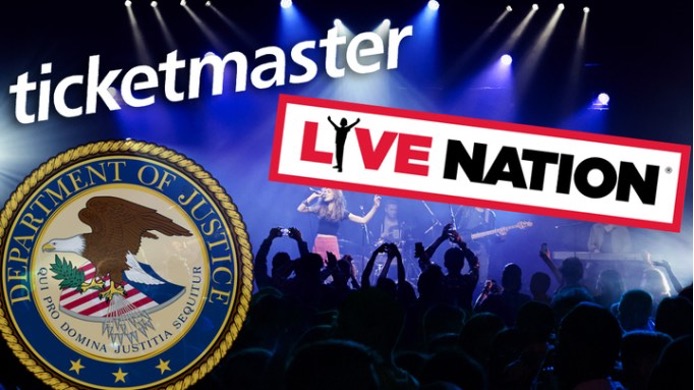
(Source)
The Department of Justice (DOJ) and the Federal Trade Commission (FTC) are both filing lawsuits against Live Nation and its wholly owned subsidiary Ticketmaster. The DOJ’s lawsuit, filed in 2024, addresses the anti-competitive practices that resulted from Live Nation’s purchase of Ticketmaster, which gave Live Nation increased dominance over the live entertainment ticketing industry; the DOJ is attempting to separate the two entities. The DOJ alleges that Live Nation–Ticketmaster is abusing its monopoly by retaliating against promotion companies that work with its competitors, locking vendors into long exclusive contracts, restricting artists’ choice of venues, and buying out its smaller competitors. Live Nation controls over 80 percent of the US’s major concert venue primary ticketing, has exclusive arrangements with 265 concert venues, and manages more than 400 big name artists.
The FTC filed its lawsuit against Live Nation and Ticketmaster this past September to address their deceptive ticketing practices. While this suit does not directly address antitrust issues, it can be argued that Live Nation–Ticketmaster feel emboldened by their monopoly over the live event space to conduct their business, since consumers have no other method of ticketing. The FTC points to three main deceptive practices: (1) listing tickets for substantially lower prices but adding mandatory fees at checkout, (2) knowingly allowing scalpers to evade the ticket buying limit placed upon customers, and (3) “triple dipping” into fees when since fees are collected when scalpers buy, when scalpers sell, and when consumers buy from the scalpers.
The United States functions on free market principles, since it is believed that competitive markets allow consumers to buy goods and services at a lower price while simultaneously maximizing quality. Therefore, the legislature established antitrust laws to maintain competitive markets. Antitrust laws protect against three behaviors: (1) collusion between competing companies, (2) anti-competitive mergers, and (3) monopolies.
The two primary statutes that establish antitrust laws are the Sherman Antitrust Act and the Clayton Act. The Sherman Antitrust Act prohibits collusion between companies that would restrict or rig trade in a fashion that would put consumers in a worse off position. It also prohibits companies from attempting to monopolize or maintain monopoly power in a specific market by suppressing competitors.
The Clayton Act prohibits mergers that may create a monopoly. The Act also prohibits certain selling practices, like “tying agreements,” which forces consumers to buy one product that is tied to another, even if they just wanted only one of the products. One of the most important prohibitions of the Act is the limitation on predatory pricing, since it prevents companies from cutting their prices to force their competitors out of business before raising their prices again. This practice not only is anti-competitive, but it also may lead to higher prices in the long run. The Clayton Act also prevents collusion by prohibiting an individual from sitting on the board of directors for competing companies to avoid strategy synchronization.
The DOJ’s lawsuit is alleging that Live Nation-Ticketmaster’s suppression of its competitors is a violation of the Sherman Act. It wants to use the power awarded in the Clayton Act to separate the two companies, although it had initially approved the merger in 2010. This would not be the first divestiture that has resulted from an antitrust result, most famously seen in the 1980s AT&T monopoly break up. Due to its prior approval of the merger, it likely would be most useful for the DOJ to frame the current issue as monopoly case and not as a continued merger issue. The FTC lawsuit also invokes the Clayton Act since the merger and Ticketmaster’s practices allowed it to control the ticketing space by suppressing competitors and raising ticket prices.
The landmark 1982 AT&T case is known as one of the most important antitrust cases in American history, since it shows that the US government takes monopoly seriously and wants to encourage competition for consumers; AT&T, who controlled both long-distance and local telecommunications markets, was forced to split into seven local, independent “Baby Bells” and the unregulated national long-distance company AT&T. The US determined that AT&T’s control over the markets were too broad to be competitive. There is also precedent showing that the government aims to protect against monopoly, even if there is no anticompetitive conduct. The landmark 1945 case addressing the Aluminum Company of America (Alcoa) monopoly on aluminum found that although Alcoa was not acting anticompetitively, by nature of them being a monopoly, they were setting a monopoly price, and therefore violated the Sherman Act. It is possible that the government may use the same argument in this Live Nation-Ticketmaster case, and argue that their market dominance is enough to break them up, no matter what their conduct is.
In recent years, ticket prices have increased many times over as a result of scalpers and dynamic pricing. While the scalping issue is not inherently related to antitrust law, Ticketmaster’s alleged collusion with scalpers to increase prices has had functionally similar results to as Ticketmaster colluding with competing companies. Furthermore, colluding with scalpers would be undermined if there were other viable options for consumers to buy tickets from. Similarly, Ticketmaster’s “dynamic pricing” model was under scrutiny in the United Kingdom after the Oasis tour tickets went on sale; dynamic pricing is where prices for tickets fluctuate based on demand. For higher demand shows, ticket prices can reach thousands of dollars despite an original face value of up to ten times less. Again, when Ticketmaster is the only option for tickets, not only are consumers forced to buy these marked up tickets, but they also contribute to the increasing demand, creating a positive feedback loop that exploits consumers.
Live Nation claims that even if the state were to prevail, there would be no change in prices for consumers. However, if the monopoly is broken up and there are more competitors in the ticketing market, Live Nation-Ticketmaster may not be able to as successfully use tactics like dynamic pricing. Furthermore, more space for competitors in the live events ticketing space would also force Ticketmaster to charge only the necessary fees to maintain competitive prices. Ultimately this would benefit consumers. If there is more optionality for consumers to choose where they get their tickets from, then ticket companies will lower prices to remain competitive.
If the court finds in favor of the state in either the DOJ or FTC cases, this sets very strong precedent for other website related antitrust cases, like the antitrust case that Zillow and Redfin currently face regarding alleged collusion. Although the Zillow and Redfin case involves different types of collusion than the ones that Live Nation-Ticketmaster are being accused of, if Live Nation-Ticketmaster is found to be conducting anti-competitive practices by entering exclusive contracts with large venues, it is also likely that Zillow’s exclusive agreement with Redfin will also be considered anti-competitive. It will also be interesting to see if any part of the Live Nation-Ticketmaster will affect the Yelp antitrust lawsuit against Google, where Yelp is accusing Google of using their monopoly to direct internet traffic away from Yelp reviews and to Google reviews instead. If Live Nation-Ticketmaster’s control over primary ticketing in major venues are deemed too monopolistic, then that decision might be applied to Google’s conduct, such that Google’s control over internet traffic also restricts consumer choices in a negative way.
Another notable element of this case is the fact that the state found it necessary to intervene in the entertainment space. Many consider this space to be a “luxury;” concerts and plays are not necessary goods. However, legislatures feel that it is important that the public has access to entertainment, and that monopoly do not take advantage of the general public regardless of the industry. The current moment in our government cannot be ignored either. As the government is in a shutdown, both the DOJ and the FTC are furloughing employees and have reduced operations. It is unclear when the cases will be resolved, since litigations have slowed down. While the delay continues, and until decisions come out from courts, consumers will still face increased ticket prices.
Suggested Citation: Joyce Lian, Making Concerts Affordable Again: Live Nation-Ticketmaster Antitrust Lawsuits, Cornell J.L. & Pub. Pol’y, The Issue Spotter, (Nov. 24, 2025), https://publications.lawschool.cornell.edu/jlpp/2025/11/24/making-concerts-affordable-again-live-nation-ticketmaster-antitrust-lawsuits/.
About the Author


